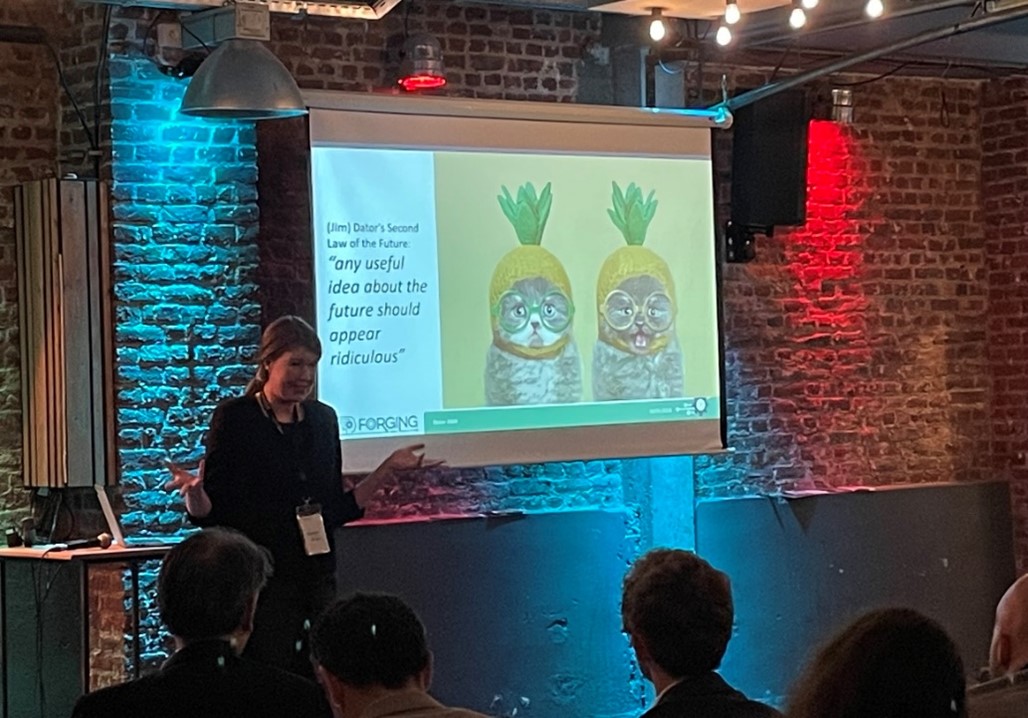From 10 to 12 May 2023, three scenario workshops took place in Brussels in the framework of the FORGING project and gathered technological experts coming from all over Europe.
Key take-aways:
- There is a growing discussion around the emerging enabling technologies (EET) and FORGING is at the core of it
- The future for these EET is very challenging and it should be considered in a “systematic” approach
- It is important to work closely and in a collaborative way with different experts to co-design the enabling technologies of the future
“The entire experience was incredibly enlightening, and it provided me with a great opportunity to connect with professionals in the field”, said Christina Latsou, Lecturer in Smart Manufacturing from Cranfield University, during the workhop where she participated as an expert.
The aim of the scenario workshops on the technology frameworks of Digital Twins, Cybersecurity and Bio-inspired materials, was to bring together experts of various backgrounds – technology, social sciences and humanities, research, industry, associations, entrepreneurs – and gather them in a co-creation modus. Thanks to their different profiles, the experts elaborated on what could be the future development of a technology framework.
The scenario workshops are a first step in the overall co-creation process FORGING is setting up where European experts exchange knowledge and ideas which could result on innovative processes, products and solutions. The objective of FORGING being to foster technology innovation with positive impact on society and without negative spill-overs on the environment.
The scenario workshops were organised as follows:
On the first day, EC Policy Officer, DG Connect, Walter Van de Velde gave a brief presentation of FORGING and the relevance of addressing the topic of emerging technologies, while acknowledging their benefits to the society and their potential risks.
This introduction was followed by a short introduction on the workshop methods and participants appreciated the get-together afterwards.
On the second day, the experts joined the workshop corresponding to their expertise and topic of interest – Digital Twins – Cybersecurity – Bio-inspired materials – and were inside each workshop split up into four moderated discussion groups.
Each of the groups elaborated on a different future scenario for “their” technology framework: in a continued growth scenario, a pessimistic one where there is less development and everything is collapsed, a disciplined one emphasizing on the need to preserve well-being and society values and, the technological transformation scenario where the technologies transform the society life.
During more than five hours, the experts in their respective groups, first, identified some core beliefs that might not change in the 2050. Then, they wrote down some significant signals of change for each PESTEC (Political, Economic, Social, Technlogical, Environmental and Cultural) category. Once displayed in the table and per category, the second part of the session was to focus on the signals of high uncertainty and high impact. The final task was to write the narrative of a future according to the scenarios of each group and present it to the group.
Partners VTT, INL, APRE, STAM and G.A.C Group helped facilitate the group sessions enabling to create a real interactive approach among all participants.
The workshops Digital Twins and Cybersecurity were scheduled in parallel on the 11th May while the bio-inspired material workshop was set up on the 12th of May. Experts of these technological field worked together on to create possible future scenarios on a co-creation approach reflecting on the human, societal and environmental impacts of these technologies.
